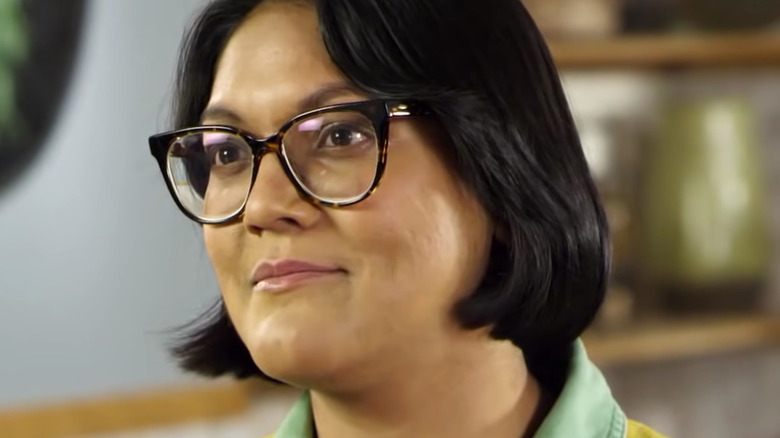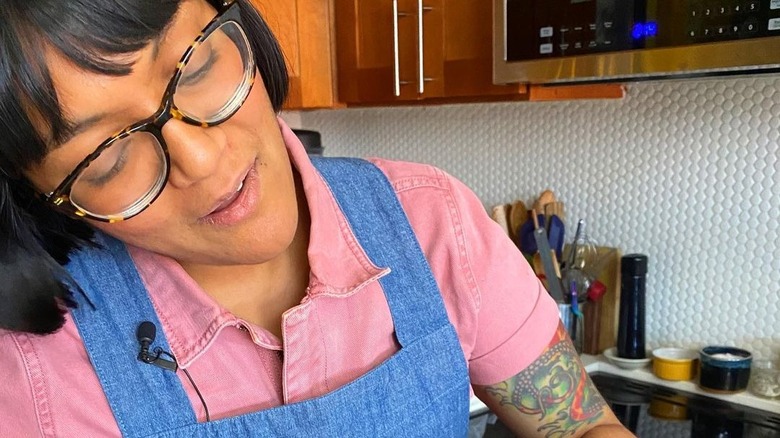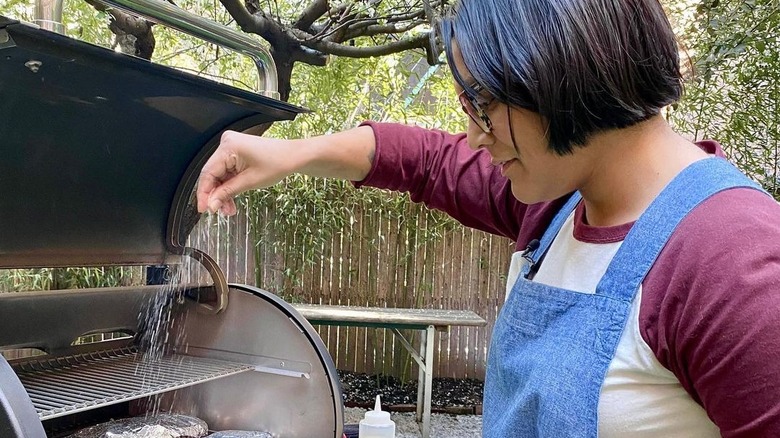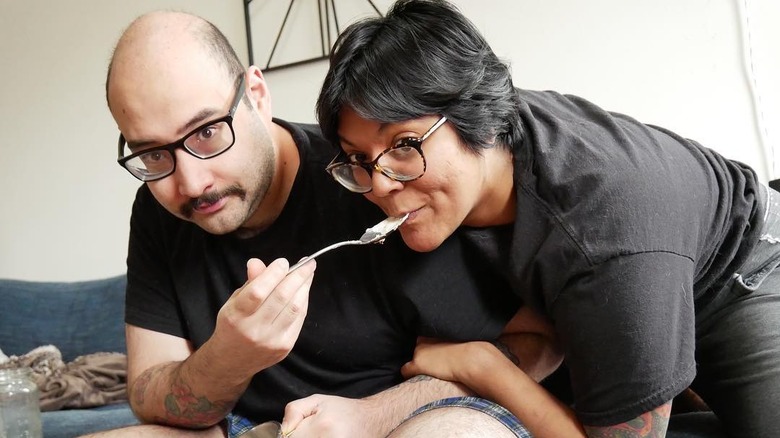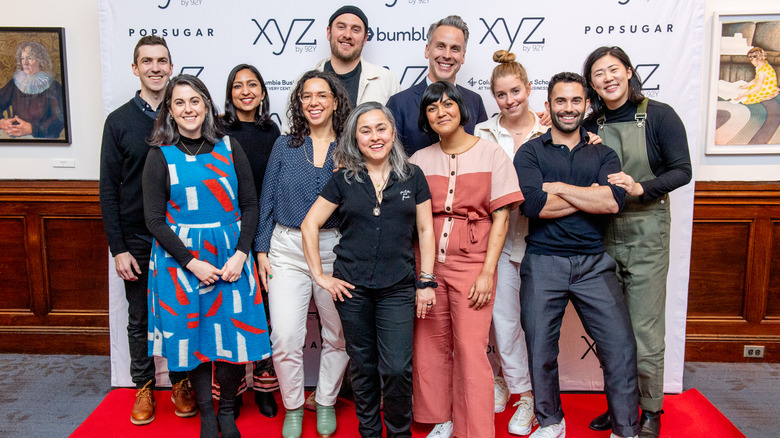The Untold Truth Of Sohla El-Waylly
You might know her as the chef who made a seven-course tasting menu entirely out of bodega snacks on YouTube. Or maybe you lay in bed at 2 a.m. drooling over her Korean-style dinner and dessert video challenge (where almost every dish successfully incorporated Oreo cookies or crème filling). Or perhaps you've followed her adaptable recipe techniques for braises, pound cakes, or chicken and rice.
She's Sohla El-Waylly, a food writer and culinary creator best known for her former role as an assistant editor at Bon Appétit, where she often stole the show in the Test Kitchen's viral videos with her expansive food knowledge and creativity. Before her work in food media, she was a New York City chef and restaurant owner. These days, she's cooking all over the internet on "Off-Script With Sohla" on Food52, "Ancient Recipes With Sohla" on the History Channel, and "Stump Sohla" on the Babish Culinary Universe, to name a few.
El-Waylly grew up as a picky eater
El-Waylly was raised in the San Fernando Valley in Los Angeles, where her mom, Salma Banu, taught her how to cook and eat adventurously using the multicultural foods available in their community, according to Vulture. Banu liked to choose new ingredients at the market and then learn how to cook with them, building feasts around the unknown ingredients.
But El-Waylly was once a picky eater as a child, she said in a New York Times Cooking video, and there was a time when she would only eat chicken korma sandwiches with mayonnaise on white bread for lunch. When she read "The Man Who Ate Everything," Jeffrey Steingarten's account of overcoming his pickiness in preparation for his food critic job at Vogue, she was inspired to expand her horizons. This helped her realize that she did, in fact, enjoy most foods and that she wanted to become a professional cook.
El-Waylly's first food jobs were at chain restaurants
El-Waylly entered the food world by decorating ice cream cakes and cones at the Baskin-Robbins stores owned and operated by her parents in the San Fernando Valley. She studied economics at UC Irvine and worked at The Cheesecake Factory as a hostess (via Vulture). After graduation, she backpacked around Europe, cooking big breakfasts for fellow hostel guests, which got her friends and free places to stay.
She finally pursued a career as a chef when she got back to Los Angeles, but her knocks on the door and offers to wash dishes for free at the city's most high-end restaurants got her nowhere, says Vulture. "I started out working wherever I could get jobs. Every single chain restaurant," El-Waylly told NYT Cooking. "I really wanted to get into fancy restaurants, so I couldn't do that until I went to culinary school."
Sohla El-Waylly made it to the Culinary Institute of America and fine-dining world
So go to culinary school she did. Sohla El-Waylly completed a two-year program at the Culinary Institute of America and went on to work at some of New York City's most prestigious kitchens, like Atera and Del Posto, according to Vulture. Those days taught her many of the advanced techniques she sometimes demonstrates on YouTube, like making foam out lime juice and flavored ice with chiles and liquid nitrogen. The biggest lesson she learned, though, was discipline, she told NYT Cooking. "We would start at 10 a.m. and work until 2 a.m., so now every job feels relatively easy," she said.
El-Waylly has been vocal about her dissatisfaction with some parts of her culinary journey. She recounted being sexually harassed by a CIA dean, who received no ramifications, and the discrimination she faced as a woman of color in many of her restaurant jobs. Today, El-Waylly says that most of what she learned about cooking good food came from her mom, whom she still calls whenever she makes Bengali dishes. After CIA, "when I would make my mom's food, I would always try and update it or refine it, but it actually makes it terrible," she told NYT Cooking. "So now I just trust my mom and I like to make things the traditional way."
El-Waylly owned a restaurant with her husband, fellow chef Ham El-Wahlly
Sohla El-Waylly met her husband, Ham El-Waylly, in culinary school, and the duo worked at many of the same restaurants at the beginning of their careers, eventually deciding to open their own. Frustrated with investors who expected them to make "brown food" because of their ethnicities, they opened a neo-diner called Hail Mary in Brooklyn with just enough money to hold them over for two months (via Vulture). They served modern interpretations of diner classics, like toad in a hole with duck egg and preserved lemon, fried burrata with homemade tomato sauce (an ode to mozzarella sticks), and foie gras matzo ball soup before closing after 11 months, per Gothamist.
The couple believes that they might have been more successful had they served the food that customers and critics "expected" of them, like Bengali dishes from Sohla's background or Bolivian-Egyptian food from Ham's, they told GQ. "There are white chefs that can pull from different cultures without explanation, but us making white food always needs a thesis behind it," El-Waylly said. "We made something that we loved and that represented us through and through," they told Gothamist, which called their hybrid concept ambitious and hard to sustain.
Sohla El-Waylly inspired fellow Bon Appétit staffers to speak out
"El-Waylly's job at Bon Appétit wasn't meant for someone with so much experience, but she took it anyway," Vulture wrote about the assistant editor job she took in 2019 after closing Hail Mary and quitting a job at Serious Eats. Bon Appétit hired El-Waylly to cross-test other staffers' recipes for $50,000 a year, though she eventually got a raise when she said that she was doing the work of a senior editor, reports BuzzFeed.
In the summer of 2020, a photo surfaced of former Bon Appétit editor-in-chief Adam Rapoport wearing brownface. El-Waylly publicly demanded his resignation, later revealing that she and fellow employees of color were never paid for their appearances in the brand's popular YouTube videos, despite the fact that they asked for compensation repeatedly and that their white colleagues were given contracts. El-Waylly resigned from her video work with Bon Appétit. Others, such as Rick Martinez and Molly Baz, also left and spoke out against racism and inequity at Condé Nast (via Eater).
El-Waylly was named one of the Time 100 Most Influential People of 2021 for "giving voice to experiences that are all too common in the food world," and her words fueled reckonings in food establishments beyond Bon Appétit. But El-Waylly told NPR that there is still work to be done. She says that while it's a step forward that people of color are being given better food jobs, she hopes that they will now be given the opportunity to cook from cuisines beyond those that reflect the color of their skin.
